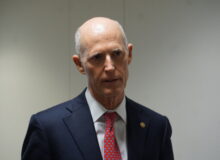Donald Trump ran for president promising to “drain the swamp,” but even his sometimes-valiant efforts amount to no more than manually removing marsh-water one tin cup at a time.
Three Supreme Court decisions at the end of its term last week remind us that the federal administrative state, not the elective offices, is the entity through which most citizens encounter their government and which most frustrates and sometimes abuses them. The next president should make it a priority to radically restructure and reduce the administrative leviathan. The virtual GOP campaign against President Trump must make massive administrative reform a central, galvanizing issue.
The challenge could even employ a Trump-like slogan: Bust the bureaucracy!
The end goal should be, within a decade, to reduce the 2.1 million federal civilian workforce by nearly a third, while simultaneously making agencies more responsive, not less, to the citizens they serve.
To do this, Congress and the president must enact complete re-writes, top to bottom, of the Administrative Procedure Act of 1946, the provisions still in force from the Pendleton Civil Service Reform Act from way back in 1883 (!), and the Civil Service Reform Act of 1978. These laws set rules governing the processes by which federal regulations are issued and enforced and governing the standards, job protections and expectations for federal employees.
The interplay of those laws right now gives bureaucrats far too much power, but far too little accountability. To be sure, there are hundreds of thousands of good, responsive, hard-working federal employees. Even the good ones, though, are hampered by a maze of rules that discourage initiative and the taking of responsibility, while making depersonalized, pass-the-buck attitudes the default option. The three laws at issue, more than the bureaucrats themselves, are responsible for the state of affairs where “bureaucracy basically makes people stupid.”

That last quote comes from longtime author-reformer Philip K. Howard, who since publication of The Death of Common Sense in 1994 has catalogued and excoriated these bureaucratic stupidities and related issues. Almost everyone who ever has navigated a federal bureaucracy with anything but the simplest question can attest to the bewildering nature of the rules and the system’s soul-sapping impersonality. What is needed, Howard says, is a complete reimagining of “bureaucratic structures.” He’s right.
Toward that end, a Virtual President Hillyer would appoint a commission to propose from-scratch legislation to revamp civil service employment rules and administrative procedures. As Howard writes in this year’s Try Common Sense, federal hiring should be politically neutral, but without guaranteed job tenure; federal employee job descriptions should be re-oriented towards solutions rather than restrictions-and-punishments; and accountability must be re-established through rewards for constructive performance and discipline for inaction or incompetence.
The commission’s recommendations would be aided by legislative rules similar (although with some leeway for legislative amendment) to those used under the successful Defense Base Closure and Realignment Act of 1990. Its mandate would be major, groundbreaking reform, not mere nibbling around the edges. It would be afforded exactly 18 months to produce full, draft legislation.
The commission should be weighted toward conservative principles, but not terribly overweighted, because in the end its product will need buy-in across the political spectrum. Indeed, its ideal membership already is clear in my mind, if the following people would agree to serve.
The commission chairman should have a reputation as relatively non-ideological. The choice is obvious: Philip Howard himself.
There should be three vice chairs. The first would be Don Devine, who as President Reagan’s director of the Office of Personnel Management oversaw a rational and systemic reduction of the federal workforce by 100,000 employees. The second would be Cass Sunstein, who was Administrator of the White House Office of Information and Regulatory Affairs during President Obama’s first term. He’s a liberal, but serious about regulatory reform – and any good commission should have someone to provide “pushback” against ideological blind spots.
For a third vice-chair, somebody with some practical political sensibilities in addition to administrative expertise would be ideal. Former Louisiana governor Bobby Jindal is a systems expert who was executive director of a Medicare reform commission that produced a superb proposal in the late 1990s that died in the midst of the partisanship of the Clinton impeachment drama. He’s the choice.
The House and Senate majority and minority leaders should each be afforded an appointment. Up to seven other commission members, for a maximum of 15, should be drawn from think tanks, academia, federal workers themselves, and private enterprise. All would be presidentially appointed.
The expected result would be simple but profound. Americans deserve to have a government that is responsive, efficient, understandable, and accountable. Reform of those three major laws, via this commission, should accomplish these goals, all while also saving many tens of billions of dollars each year. Bust the bureaucracy, now!
[A shorter version of this column ran at the Washington Examiner, here.]






